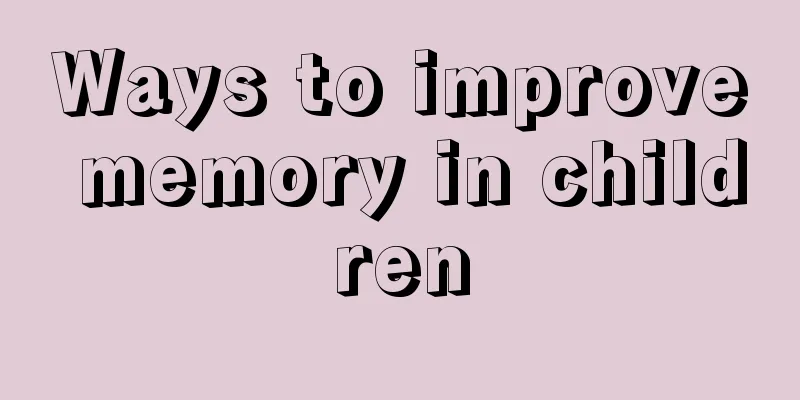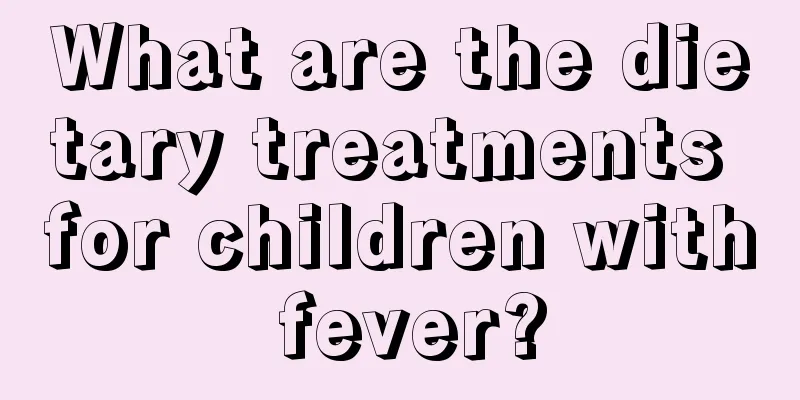My baby's hair is sparse and grows slowly. Do you know how to solve this problem?

|
Parents will be worried once they find that their children have thinning hair, but many people are just anxious and do not take correct and effective solutions. In fact, this problem is not difficult to solve. Parents need to help their children do the following. Rule number one: Wash your baby’s hair frequently. Because babies grow and develop very quickly, their metabolism is very active. Therefore, before 6 months old, it is best to wash your baby's hair once a day, especially when the weather is hot. After 6 months, you can change to washing your hair every 2-3 days. Keeping your hair clean regularly can provide benign stimulation to the scalp, thereby promoting hair germination and growth. If you don't wash your baby's hair, the oil, sweat and pollutants on the scalp will irritate the scalp, causing itching, blisters and even infection. This makes it easier to remove the hair. It is worth noting that when washing your baby's hair, you should use pure, mild, non-irritating baby shampoo, preferably one that can easily produce foam. Also, when washing the baby's hair, gently massage the baby's scalp with the tips of your fingers. Do not rub the hair hard to prevent the hair from becoming tangled and difficult to comb, which may cause the hair to fall out easily. Rule 2: Comb your baby’s hair frequently. Mothers often carry a special comb for their baby. Whenever it is convenient, they will take it out and comb their baby's hair a few times, because combing the baby's hair frequently can stimulate the scalp, promote local blood circulation, and help hair growth. However, do not use a comb that is too hard. It is best to use a rubber comb because it is both elastic and soft and will not easily damage the baby's delicate scalp. Here is a reminder that when mothers comb their baby's hair, they must comb it in the direction of the baby's natural hair growth, and the movements and force should be consistent. Do not comb the baby's hair in the opposite direction according to your own wishes. Rule 3: Give your baby enough sleep. The baby's brain is not yet fully developed, so it is easy to get tired. If the baby does not get enough sleep, physiological disorders are likely to occur, which will lead to poor appetite, frequent crying and easy illness, which will indirectly lead to poor hair growth. Usually, a newborn baby needs to sleep 20 hours a day; when they are 1-3 months old, they need to sleep 16-18 hours a day; when they are 4-6 months old, they need to sleep 15-16 hours a day; when they are 7-9 months old, they need to sleep 14-15 hours a day; and when they are over 10 months old, they need to sleep 10-13 hours a day. Rule 4: Let your baby get more sun. Appropriate sunlight and fresh air are very beneficial to the growth of baby's hair, because ultraviolet rays not only help kill bacteria, but also promote blood circulation in the scalp. However, do not expose your baby's head to strong sunlight. When going out in strong sunlight, be sure to put a sun hat on your baby's head to avoid sunburn on the scalp. Rule 5: Feed nutrition. The scalp of children aged 3-6 secretes less oil than that of adults, so their hair is particularly prone to losing its softness and shine. This stage is a special period for children's hair care. Hair begins to grow at different rates and have different growth cycles. Each hair follicle undergoes cyclical changes independently, and adjacent hair follicles are not in the same growth cycle. Children's shampoo should not only be pure, mild and non-irritating, but also be able to deeply moisturize, so that children's hair can be healthy, soft and shiny. Rule 6: Supplement protein. In addition to daily care, parents should also pay attention to their children's hair health. Proper diet will also make you no longer worry about your child's "three thousand troubles". Experts remind that children can supplement protein in their daily diet. Since 97% of hair is protein, hair growth requires a certain amount of sulfur-containing amino acids, which cannot be synthesized by the human body and must be obtained through protein in food. If the daily protein intake is less than 50 grams, it will cause a serious lack of protein in the human body, which will inevitably affect the growth of hair. |
<<: The symptoms of calcium deficiency in baby's hair, parents should understand these knowledge
>>: What foods are good for children with liver fire?
Recommend
What to do if your baby has otitis media
The incidence of otitis media in babies is very h...
Treatment for five-month-old baby sweating while sleeping
I don’t know if you have ever encountered the sit...
Newborn babies like to sleep on their side
Many parents think that children should follow th...
What causes diarrhea in children?
Children at home are the apple of their parents’ ...
How many hours does the baby sleep through the night?
Some babies can sleep through the night when they...
Dietary considerations for children with paronychia
Nowadays, many children have paronychia, which ha...
Why does my baby cry at night after getting a vaccination?
From the day of birth, the baby needs to go to th...
What should I do if a little girl has precocious puberty?
In today's society, precocious puberty in chi...
Do you know how to correct children's lack of concentration?
When it comes to the topic of children's inab...
My child's ears seem to be stuffy with water, what's going on?
If a child has symptoms of stuffy ears as if wate...
Causes and treatment of neonatal facial eczema
Newborn facial eczema is a relatively common dise...
What should not be eaten for precocious puberty
Not all foods are suitable for children to eat. P...
What to do if your child has corns
Children's physical constitution is not that ...
What should I do if my child always sweats?
Children's physical development is not yet co...
Why does a five-month-old baby cry at night?
Many parents go to work with dark circles under t...









